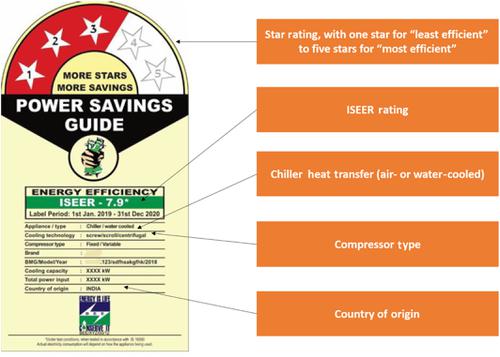当前位置:
X-MOL 学术
›
WIREs Energy Environ.
›
论文详情
Our official English website, www.x-mol.net, welcomes your
feedback! (Note: you will need to create a separate account there.)
Staying cool: The development of India's pioneering energy efficiency policy for chillers
Wiley Interdisciplinary Reviews: Energy and Environment ( IF 5.4 ) Pub Date : 2020-03-16 , DOI: 10.1002/wene.372 P. K. Mukherjee 1 , Eric Gibbs 1 , Archana Walia 1 , Colin Taylor 1
Wiley Interdisciplinary Reviews: Energy and Environment ( IF 5.4 ) Pub Date : 2020-03-16 , DOI: 10.1002/wene.372 P. K. Mukherjee 1 , Eric Gibbs 1 , Archana Walia 1 , Colin Taylor 1
Affiliation

|
Chillers are the key energy‐consuming piece of equipment in most large space cooling systems. They can account for more than 40% of total energy consumption in any typical commercial building and in specific industrial building installations depending on the product and process. With climate change driving rapidly rising demand for commercial and industrial cooling, especially in emerging economies, energy efficiency policies for chillers are crucial to moderate future electricity demand and thereby minimize greenhouse gas emissions. However, most developing and emerging economies lack energy efficiency policies for this significant and growing cooling equipment sector. India recently announced new energy efficiency policies for chillers, projected to avoid 28 TWh of electricity consumption and 23 million tons of CO2 emissions cumulatively through 2030. This article presents a case study of the unique challenges and solutions required to design a new energy efficiency policy for chillers in India. First, the energy consumed in chiller systems is sensitive to building occupancy, load changes, seasonal variations, operation and maintenance, and climatic conditions. In order to address these sensitivities, the chiller testing standard in India factors local weather and temperature conditions into energy performance ratings to account for these sensitivities. Further, every large chiller is a customized product, therefore developing a viable policy and implementation process required collaboration with international and national experts in standardization, manufacturers, building consultants, and testing laboratories.
中文翻译:

保持凉爽:印度首创的冷水机组节能政策的发展
冷水机是大多数大型空间冷却系统中关键的能耗设备。在任何典型的商业建筑和特定的工业建筑安装中,根据产品和工艺的不同,它们可以占总能耗的40%以上。随着气候变化推动对商业和工业制冷需求的迅速增长,特别是在新兴经济体中,制冷机的能效政策对于减缓未来的电力需求并从而最大程度减少温室气体排放至关重要。但是,大多数发展中和新兴经济体缺乏针对这一重要且不断增长的冷却设备行业的节能政策。印度最近宣布了针对冷水机的新能源效率政策,预计将节省28 TWh的电力消耗和2300万吨的CO 2到2030年累积排放量。本文以案例研究为基础,设计了印度冷水机新能源效率政策所需的独特挑战和解决方案。首先,制冷机系统中消耗的能量对建筑物占用,负载变化,季节变化,运行和维护以及气候条件敏感。为了解决这些敏感性问题,印度的冷水机测试标准将当地的天气和温度条件纳入了能源性能等级,以考虑这些敏感性。此外,每个大型冷水机都是定制产品,因此制定可行的政策和实施过程需要与国际和国家标准化专家,制造商,建筑顾问和测试实验室合作。
更新日期:2020-03-16
中文翻译:

保持凉爽:印度首创的冷水机组节能政策的发展
冷水机是大多数大型空间冷却系统中关键的能耗设备。在任何典型的商业建筑和特定的工业建筑安装中,根据产品和工艺的不同,它们可以占总能耗的40%以上。随着气候变化推动对商业和工业制冷需求的迅速增长,特别是在新兴经济体中,制冷机的能效政策对于减缓未来的电力需求并从而最大程度减少温室气体排放至关重要。但是,大多数发展中和新兴经济体缺乏针对这一重要且不断增长的冷却设备行业的节能政策。印度最近宣布了针对冷水机的新能源效率政策,预计将节省28 TWh的电力消耗和2300万吨的CO 2到2030年累积排放量。本文以案例研究为基础,设计了印度冷水机新能源效率政策所需的独特挑战和解决方案。首先,制冷机系统中消耗的能量对建筑物占用,负载变化,季节变化,运行和维护以及气候条件敏感。为了解决这些敏感性问题,印度的冷水机测试标准将当地的天气和温度条件纳入了能源性能等级,以考虑这些敏感性。此外,每个大型冷水机都是定制产品,因此制定可行的政策和实施过程需要与国际和国家标准化专家,制造商,建筑顾问和测试实验室合作。











































 京公网安备 11010802027423号
京公网安备 11010802027423号